
Highway 61 Revisited is the sixth studio album by American singer-songwriter Bob Dylan, released on August 30, 1965, by Columbia Records. Having until then recorded mostly acoustic music, Dylan used rock musicians as his backing band on every track of the album, except for the closing track, the 11-minute ballad "Desolation Row". Critics have focused on the innovative way Dylan combined driving, blues-based music with the subtlety of poetry to create songs that captured the political and cultural chaos of contemporary America. Author Michael Gray has argued that, in an important sense, the 1960s "started" with this album.
"Desolation Row" is a 1965 song by the American singer-songwriter Bob Dylan. It was recorded on August 4, 1965, and released as the closing track of Dylan's sixth studio album, Highway 61 Revisited. The song has been noted for its length (11:21) and surreal lyrics in which Dylan weaves characters into a series of vignettes that suggest entropy and urban chaos.

Blonde on Blonde is the seventh studio album by American singer-songwriter Bob Dylan, released as a double album on June 20, 1966, by Columbia Records. Recording sessions began in New York in October 1965 with numerous backing musicians, including members of Dylan's live backing band, the Hawks. Though sessions continued until January 1966, they yielded only one track that made it onto the final album—"One of Us Must Know ". At producer Bob Johnston's suggestion, Dylan, keyboardist Al Kooper, and guitarist Robbie Robertson moved to the CBS studios in Nashville, Tennessee. These sessions, augmented by some of Nashville's top session musicians, were more fruitful, and in February and March all the remaining songs for the album were recorded.
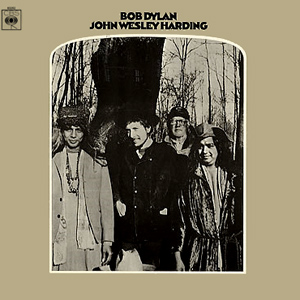
John Wesley Harding is the eighth studio album by American singer-songwriter Bob Dylan, released on December 27, 1967, by Columbia Records. Produced by Bob Johnston, the album marked Dylan's return to semi-acoustic instrumentation and folk-influenced songwriting after three albums of lyrically abstract, blues-indebted rock music. John Wesley Harding was recorded around the same time as the home recording sessions with The Band known as The Basement Tapes.

Low was an American indie rock band from Duluth, Minnesota, formed in 1993 by Alan Sparhawk and Mimi Parker. The band was a trio from 1993 to 2020, having featured four different bassists. Low disbanded following the death of Parker in 2022.
Ripsaw was a Duluth, Minnesota newspaper published from 1917 to 1926 and again from 1999 to 2005. The paper was a scandal sheet during the first years of publication, with a reputation for muckraking, sensationalism and criminal libel. The revival was similar in tone, though the publishers changed.

Ballad of Easy Rider is the eighth album by the American rock band the Byrds and was released in November 1969 on Columbia Records. The album was named after the song "Ballad of Easy Rider", which had been written by the Byrds' guitarist and singer, Roger McGuinn, as the theme song for the 1969 film, Easy Rider. The title was also chosen in an attempt to capitalize on the commercial success of the film, although the majority of the music on the album had no connection with it. Nonetheless, the association with Easy Rider heightened the Byrds' public profile and resulted in Ballad of Easy Rider becoming the band's highest charting album for two years in the U.S.

"Positively 4th Street" is a song written and performed by Bob Dylan, first recorded in New York City on July 29, 1965. It was released as a single by Columbia Records on September 7, 1965, reaching No. 1 on Canada's RPM chart, No. 7 on the U.S. Billboard Hot 100, and No. 8 on the UK Singles Chart. Rolling Stone magazine ranked the song as No. 203 in their 500 Greatest Songs of All Time list.

"Highway 61 Revisited" is the title track of Bob Dylan's 1965 album Highway 61 Revisited. It was also released as the B-side to the single "Can You Please Crawl Out Your Window?" later the same year. In 2004, Rolling Stone magazine ranked the song as number 364 in their 500 Greatest Songs of All Time.
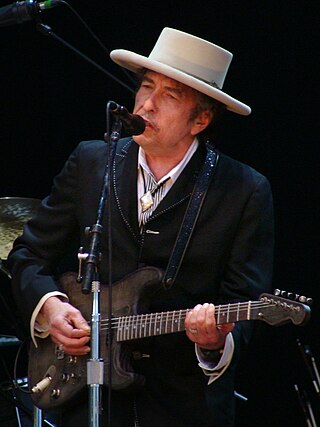
Bob Dylan is an American singer-songwriter. Generally regarded as one of the greatest songwriters ever, Dylan has been a major figure in popular culture over his 60 year career. Much of his most celebrated work dates from the 1960s, when songs such as "Blowin' in the Wind" (1963) and "The Times They Are a-Changin'" (1964) became anthems for the civil rights and antiwar movements. His lyrics during this period incorporated political, social, philosophical, and literary influences, defying pop music conventions and appealing to the burgeoning counterculture.
"It's All Over Now, Baby Blue" is a song written and performed by Bob Dylan and featured on his Bringing It All Back Home album, released on March 22, 1965, by Columbia Records. The song was recorded on January 15, 1965, with Dylan's acoustic guitar and harmonica and William E. Lee's bass guitar the only instrumentation. The lyrics were heavily influenced by Symbolist poetry and bid farewell to the titular "Baby Blue". There has been much speculation about the real life identity of "Baby Blue", with possibilities including Joan Baez, David Blue, Paul Clayton, Dylan's folk music audience, and even Dylan himself.

Charlie Parr is an American country blues musician. Born in Austin, Minnesota, he spent part of his childhood in Hollandale before starting his music career in Duluth. His influences include Charlie Patton, Bukka White, Reverend Gary Davis, Dave Van Ronk, Mississippi John Hurt, and his self-professed "hero" "Spider" John Koerner. He plays a Mule resonator, National resonator guitar, a fretless open-back banjo, and a twelve-string guitar, often in the Piedmont blues style. He is divorced from Emily Parr, who occasionally adds vocals to his music. He has two children.
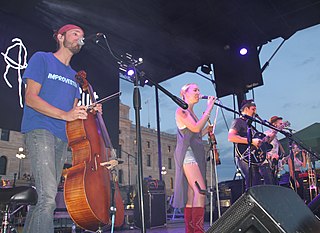
Cloud Cult is an experimental indie rock band from St. Cloud, Minnesota, United States, led by singer-songwriter Craig Minowa. The name originated from the ancient prophecies of indigenous North Americans.
"You Ain't Goin' Nowhere" is a song written by American musician Bob Dylan in 1967 in Woodstock, New York, during the self-imposed exile from public appearances that followed his July 29, 1966 motorcycle accident. A recording of Dylan performing the song in September 1971 was released on the Bob Dylan's Greatest Hits Vol. II album in November of that year, marking the first official release of the song by its author. Earlier 1967 recordings of the song, performed by Dylan and the Band, were issued on the 1975 album The Basement Tapes and the 2014 album The Bootleg Series Vol. 11: The Basement Tapes Complete.
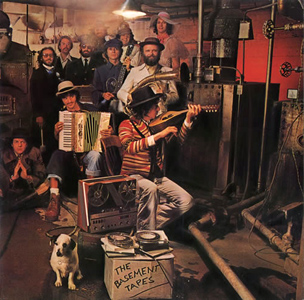
The Basement Tapes is the sixteenth album by American singer-songwriter Bob Dylan and his second with the Band. It was released on June 26, 1975, by Columbia Records. Two-thirds of the album's 24 tracks feature Dylan on lead vocals backed by the Band, and were recorded in 1967, eight years before the album's release, in the lapse between the release of Blonde on Blonde and the subsequent recording and release of John Wesley Harding, during sessions that began at Dylan's house in Woodstock, New York, then moved to the basement of Big Pink. While most of these had appeared on bootleg albums, The Basement Tapes marked their first official release. The remaining eight songs, all previously unavailable, feature the Band without Dylan and were recorded between 1967 and 1975.
The Homegrown Music Festival is Duluth, Minnesota's annual showcase of local music from the Arrowhead region, which includes Minnesota's Iron Range and communities on the north and south shores of Lake Superior. The event has grown from featuring 10 local acts in 1999 to roughly 200 in recent years. It happens every year during the first week of May. The 25th annual Homegrown is scheduled for April 30 to May 7, 2023.
"I'll Keep It with Mine" is a song written by Bob Dylan in 1964, first released by folk singer Judy Collins as a single in 1965. Dylan attempted to record the song for his 1966 album Blonde on Blonde.

"Big River" is a song written and originally recorded by Johnny Cash. Released as a single by Sun Records in 1958, it went as high as #4 on the Billboard country music charts and stayed on the charts for 14 weeks.
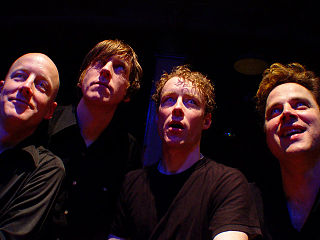
The Black-eyed Snakes is an American blues rock band from Duluth, Minnesota. Since releasing their debut album "It's the Black-eyed Snakes" in 2001, the band has toured the U.S., including with Charlie Parr, among others. Front man Alan Sparhawk also performs with Low and Retribution Gospel Choir.
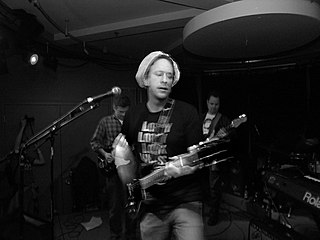
Father Hennepin is an American alternative country band from Duluth, Minnesota. Since releasing the debut album "Crooked With Gin" in 2001, the band has been perennial headliners of the Homegrown Music Festival in Duluth.














